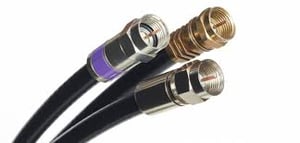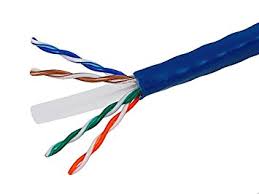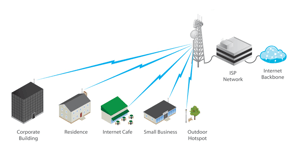 Business Internet is critical to companies of every size now days. Even small businesses now use SaaS applications to run HR, point of sale, inventory, track sales transactions, bookkeeping, and their phone systems. All those applications are accessed over IP connectivity. Some larger organizations have the budget for private IP connectivity such as MPLS but many companies access their business applications using Internet.
Business Internet is critical to companies of every size now days. Even small businesses now use SaaS applications to run HR, point of sale, inventory, track sales transactions, bookkeeping, and their phone systems. All those applications are accessed over IP connectivity. Some larger organizations have the budget for private IP connectivity such as MPLS but many companies access their business applications using Internet.
Here are 3 types of Internet options available to most any business:
Broadband Solutions (DSL, Cable, T1s)


Since the invention of the telephone over 100 years ago the dominant way to connect your business has involved copper cabling. Cable uses coax and telco's use twisted copper pairs. Broadband is very economical and you may see download speeds upward of as much as 1Gb. Broadband however almost always throttles back your upload speed. The strength of broadband is in its low cost for relative high speed download but its greatest weakness is its lack of upload speed. Cable has yet another weakness in that it's on a shared network and its speed fluctuates the more users there are online in your area. Broadband is primarily a residential grade service but if you can get enough bandwidth to offset the inherent problems it can be worth-while for a business. In other words if you can get a 100mb broadband connection with at least 10mb upload and you’re a small business such as retail then you can probably deal with the fluctuations in performance in exchange for the cheap price point. If not then I recommend you upgrade to fiber.
Wireless Solutions (wireless, air fiber etc)

Fiber Solutions - (High Speed Ethernet, Dedicated Internet)

Fiber optics versus copper or other mediums can be boiled down to the speed of photons versus electrons. Photons travel at the speed of light while electrons travel at less than 1% of the speed of light. Electrons run over Copper. It doesn’t take much more than that to realize that for high speed data transmission Fiber is ideal. Fiber experiences less signal loss than copper so distance really isn't a factor. While fiber can be harder to come by from an availability standpoint it offers speed, reliability and cost effectiveness and is the "go-to" technology for business Internet. At one time fiber was only available to large corporations in densely populated metropolitan areas. As early as 5 years ago we sold a DS3 of Internet (the equivalent of 28 T1's or 45mb) for $5000 per month on a 3yr agreement. Today fiber based Internet is sold in dedicated increments of 100mb (100mb x 100mb) and can be as cheap as $165 per month for 100mb up to $650 a month for 1Gb x 1 Gb dedicated Internet including a bundled router. Its also much more readily available and carriers will build out to customer for free as long as the fiber is close and ROI makes sense. Fiber Optic wireline connectivity is the premiere network connectivity medium available today and is the Cadillac of Internet options. Don't be fooled by local municipalities and small ISPs who tout fiber networks because they don't have the same network monitoring, and carrier grade endpoints as major carriers. Do your research, find a consultant and chances are you can get high speed fiber at a price point that makes sense for your business.
All 3 of these Internet mediums have their place and can be an asset to your organization if deployed for the proper purpose. Small locations can benefit from the speeds of DSL and Cable at a lower price point. Organizations looking for a backup solution for disaster recovery and redundancy should deploy some wireless in their networks. Companies using VoIP, SaaS applications, internet based POS, video or other bandwidth demanding services should seek out and deploy Fiber solutions.
See what services are available in your area



